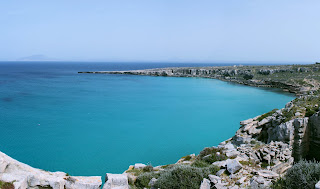Favignana: Storied island of sun, sea and stone
By Jon Van Housen and Mariella Radaelli
 |
| A short sail from nearby Trapani |
Ready for a
fight, they instead found the pleasant sounds of water lapping against the
rocks and gulls overhead. With no opposition they made their way inland and
eventually found an Italian colonel emerging from a farmhouse. Through
interpreters they learned he was willing to surrender his garrison of 437 men
and three large guns trained on the port of Trapani 20 miles distant.
But according to
a written account by military historian William B. Breuer there was still a
matter of honor to settle. The colonel would not hand over his men, weapons and
ceremonial sword to a soldier of lesser rank.
Returning to Trapani, they consulted with the legendary commander of the corps, Gen. Matthew Bunker Ridgway.
 |
| Gen. Ridgway in Sicily |
Favignana then
turned decidedly peaceful, returning to the timeless rhythms of the seasons and
sea. Some gun emplacements and pillboxes can still be found on the rocky
island, but it would be a number of years before the next strong structures
were built and they would serve a much more peaceful purpose – helping supply
the Bluefin tuna for which the region is still renowned.
Appearing as a stark stone iceberg piercing the azure Mediterranean, the island like the rest of Sicily has long heard the sounds of war. But through the centuries it also heard the toil of quarrymen, the so-called pirriaturi, whose hard labor and skills forged impressive caves built with the Favignana stone already famous in Roman times. The entire island is dotted with the geometry of disused quarries that resemble Arab gardens.Today some are home to luxury restaurants and tourist operations such as the Cave Bianche Hotel.
Favignana and the
even smaller island of Levanzo feature some remarkable rock art and cave
shelters that date back to around 10,000 B.C.
The Miuccia Prada
house hides among the crumbling stone ruins and gnarled olive trees of Levanzo
with a breathtaking vista once awash
with Roman triremes and Carthaginian boats. Not far from the sandy beaches, a
decisive naval engagement stripped Carthage of its title Queen of the Seas. In
in 241 B.C. it was the site of the Roman victory that ended the First Punic
War, a watershed event recorded by the ancient historian Polybius. The waters are still rich in artifacts from
the famous battle. In recent years remnants of 12 bronze warship rams along
with bronze helmets and armor, and widely scattered amphora, have been found.
Research is continuing.
Staying overnight
in Favignana you can listen to the turtle-doves sing. In the 19th and 20th centuries, it was the song of
tuna fishermen, the tonnaroti, that resounded across the island. Prayers and blessings were sung during and after the mattanza, or Sicilian tuna fishing harvest:
Jesu Cristu cu li Santi
E lu Santu Sarvaturi
Criasti i pisci ammari
Li tunni e li tunnari
U prumettiri e nun mancari
Jesu Cristu cu li Santi
E lu Santu Sarvaturi
Criasti i pisci ammari
Li tunni e li tunnari
U prumettiri e nun mancari
 |
| A decisive battle in the First Punic War, 241 B.C. |
Since the time of
the Bourbons, the most dangerous prisoners were sent to a prison on Favignana built around an ancient Norman fort. During the 1960s and ’70s, Red Brigade
terrorists were housed in the maximum security facility, but today it is home
to a handful of less-dangerous internees serving out their time on a type of
work release.
Naturally, the
local cuisine is rich in seafood. Taste the busiate with tuna sauce, the spaghetti
with limpets and end with cassatine and cassatelle desserts. Bottarga, a
salted, cured fish roe, and wine from the grapes of Favignana are also
favorites.
In ancient times
Favignana was called Aegusa, meaning Goat Island in Greek. The modern name is derived
from favonio, warm wind.
How to get
there:
Daily flights to
Trapani, accessible by two-hour ferry ride from Trapani.
Where to stay:
Cave Bianche
Hotel
Strada Comunale Fanfalo, Favignana
Phone: 0039 0923 925451
info@cavebianchehotel.it
booking@cavebianchehotel.it
 |
| Mediterranean sun and stone: Entrance to the Aegusa Hotel. |
Aegusa Hotel
Via Garibaldi 11, Favignana.
Phone:0039 0923
921638
info@aegusahotel.it:
Best time to go:
May to October
This story was
published on April 14 in the print edition of the national L'Italo-Americano newspaper based in Monrovia,
California, but its online edition requires a subscription.



Comments
Post a Comment